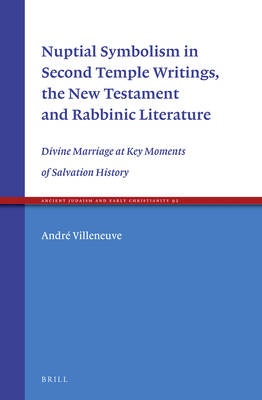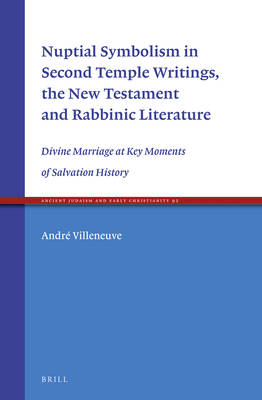
- Afhalen na 1 uur in een winkel met voorraad
- Gratis thuislevering in België vanaf € 30
- Ruim aanbod met 7 miljoen producten
- Afhalen na 1 uur in een winkel met voorraad
- Gratis thuislevering in België vanaf € 30
- Ruim aanbod met 7 miljoen producten
Zoeken
Nuptial Symbolism in Second Temple Writings, the New Testament and Rabbinic Literature
Divine Marriage at Key Moments of Salvation History
André Villeneuve
€ 337,45
+ 674 punten
Omschrijving
In Nuptial Symbolism in Second Temple Writings, the New Testament and Rabbinic Literature, André Villeneuve examines the ancient Jewish concept of the covenant between God and Israel, portrayed as a marriage dynamically moving through salvation history. This nuptial covenant was established in Eden but damaged by sin; it was restored at the Sinai theophany, perpetuated in the Temple liturgy, and expected to reach its final consummation at the end of days.
The authors of the New Testament adopted the same key moments of salvation history to describe the spousal relationship between Christ and the Church. In their typological treatment of these motifs, they established an exegetical framework that would anticipate the four senses of Scripture later adopted by patristic and medieval commentators.
The authors of the New Testament adopted the same key moments of salvation history to describe the spousal relationship between Christ and the Church. In their typological treatment of these motifs, they established an exegetical framework that would anticipate the four senses of Scripture later adopted by patristic and medieval commentators.
Specificaties
Betrokkenen
- Auteur(s):
- Uitgeverij:
Inhoud
- Aantal bladzijden:
- 504
- Taal:
- Engels
- Reeks:
- Reeksnummer:
- nr. 92
Eigenschappen
- Productcode (EAN):
- 9789004316034
- Verschijningsdatum:
- 12/05/2016
- Uitvoering:
- Hardcover
- Formaat:
- Genaaid
- Afmetingen:
- 157 mm x 236 mm
- Gewicht:
- 839 g

Alleen bij Standaard Boekhandel
+ 674 punten op je klantenkaart van Standaard Boekhandel
Beoordelingen
We publiceren alleen reviews die voldoen aan de voorwaarden voor reviews. Bekijk onze voorwaarden voor reviews.








